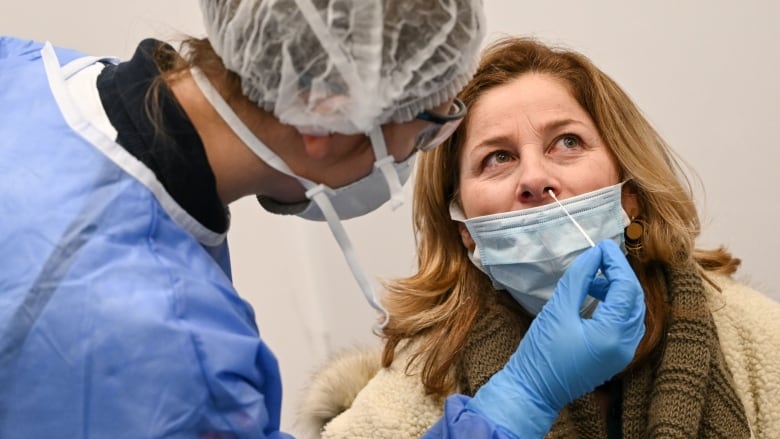Ottawa is funding COVID-19 PCR tests for hundreds of thousands of travellers. Is it worth it?
Although Omicron has spread across Canada, the government continues to do mass arrival testing of travellers

When David Frid of Gananoque, Ont., received a mandatory government-funded COVID-19 PCR test at Toronto's Pearson airport on Jan. 1, he said it seemed like a waste of money.
Frid believed the chances of him testing positive were low, because he had already tested negative after taking a pre-departure PCR test in Mexico before flying home. He also argues that testing travellers upon arrival is pointless, because the Omicron variant has already spread across Canada.
"I can't imagine the amount of money and resources that they put into this," said Frid whose arrival test came back negative. "It's a total waste."
Some medical experts also question Ottawa's arrival testing program, arguing that instead of testing thousands of travellers daily, those resources could be better used to help fight the surging Omicron variant on the home front.
Currently, hospitalizations due to COVID-19 in some provinces are climbing to worrisome levels and many symptomatic Canadians can no longer access PCR tests.

"What's really clear is that COVID is everywhere and that it's not travel that's the major source of spread," said Dr. David Carr, an emergency medicine professor in the Division of Emergency Medicine at the University of Toronto.
"Making people repeat their PCR [test] upon arrival is deflecting resources away from where they could be better spent."
Government ramps up arrival tests
Before arriving in Canada, international travellers have to pay for their own molecular (such as PCR) test and show proof of a negative result.
The tests being questioned now are on top of that, upon arrival. All unvaccinated travellers must take a PCR test when they arrive and those who are fully vaccinated must take one if they're randomly selected.
Last month, the government began to ramp up testing of fully vaccinated travellers to the point where it now has the capacity to test more than 20,000 arrivals daily.
Ottawa pays for all arrival tests, and the cost per test can range from $143 to $188, according to the Public Health Agency of Canada.
Even though the Omicron variant is surging across Canada, Health Minister Jean-Yves Duclos said on Thursday that the government will continue its commitment to mass-arrival testing.
"We have the responsibility to make sure that there is as little importation as possible of COVID-19 and Omicron cases across the border," he said at a news conference.
Would agree. Given how much COVID is in the community, the need for airport testing seems a bit ridiculous considering one could get it anywhere else. Switch health could be pivoted to popups outbreak management etc.
—@zchaglaAccording to the most recent government data, of the more than 104,596 vaccinated travellers tested after entering Canada over the week of Dec. 19 to Dec. 25, just over two per cent tested positive. Of the more than 19,154 unvaccinated travellers tested that week, three per cent tested positive.
Meanwhile, Omicron cases have spiked across Canada, causing the COVID-19 test positivity rate to climb above 20 per cent in several provinces. In Alberta and Manitoba, the rate has soared to near or above 40 per cent.
The demand for COVID-19 PCR tests is so high, many provinces have limited those tests to certain individuals, such as health-care workers and those deemed high-risk who are symptomatic.
"It's crazy to think that if you go on a weekend trip to Florida, you'll get a PCR [test], but if you have a cough, cold and a fever and you're 60 years old," you may not qualify, said Carr.
"I would love to see the personnel that we're using to detect travellers — as a screening tool — be used and employed for pop-ups and places where people with symptoms could get testing."
Dr. Sumon Chakrabarti, an infectious disease specialist at Trillium Health Partners in Mississauga, Ont., also suggests the government should redeploy its arrival testing resources. But rather than focus on widespread domestic testing, he said the funds could go toward health-care staffing, vaccine drives and treatments for COVID-19.
"I think they have much more yield right now than testing at the border," he said. "We just have to shift our perspective away from knowing every case to basically protecting the people that are the most vulnerable."
When asked about redistributing resources for arrival testing, Duclos responded that they are separate from federal resources supplied to provinces to battle COVID-19. He also pointed out that Ottawa is boosting the number of rapid antigen tests it's supplying to the provinces, which can be used by those unable to access PCR tests.
Get rid of all PCR tests for travellers?
Carr suggested that instead of demanding international travellers take two PCR tests, one 72 hours before arrival and one upon arrival, a more efficient use of resources might be to mandate travellers take a rapid antigen test right before boarding their flight.
Although PCR tests can be more accurate, antigen tests are much cheaper, don't have to be sent to a lab and can provide results within minutes. Travellers sometimes must wait days for PCR test results.
"If we're trying to make flying safer, I would rather fly in a plane of people who had a rapid test within the last 12 or 24 hours than a PCR in the last 72," said Carr.
To enter the U.S., air passengers need to take only one test — which can be a rapid antigen test — no more than 1 day before travelling.
Last week, England scrapped its COVID-19 pre-arrival test requirement for fully vaccinated travellers and changed the rules so they only have to take a rapid test after they arrive.
Last month, the Public Health Agency of Canada told CBC News that it doesn't accept rapid antigen tests for travellers because they are less sensitive than molecular tests.

.png)